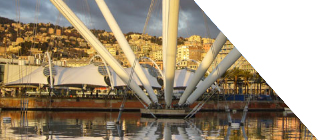 The CMS is a High Energy Physics experiment at the LHC accelerator at CERN.
The CMS is a High Energy Physics experiment at the LHC accelerator at CERN.
The LHC provides collisions of protons (and heavy ions) at the highest energies. In such collisions, lots of particles are produced in conditions close to those found immediately after the origin of the universe. These particles or their decay products are reconstructed by analyzing their passage through appropriate instruments (detectors) .
The study of particles produced in the LHC collisions allows a better understanding of the fundamental interactions and possibly to answer questions such as the origin of mass, the existence of extra dimensions of space-time, the nature of the so-called dark matter, the reason for the disappearance of antimatter and more.
The CMS is one of the largest scientific collaborations ever, participating in the experiment over 4000 physicists and engineers who belong to universities and research institutions in 41 countries.
The Genoa team was involved in the construction of the superconducting magnet of the CMS, in collaboration with Ansaldo of Genoa, and it is currently active in the analysis of new algorithms for reconstruction of tracks of charged particles, in the new proton spectrometer PPS, in the integration of new simulation methods of various processes and in the study of particles that decay into pairs of top quark (the heaviest elementary particle discovered up to now) and in the study of the properties of the top quark itself. For the detector upgrade in view of the high-luminosity data taking, the Genova Group is involved in the construction of a part of the new central tracker, made of innovative solid-state detectors.
Personnel from INFN: Fabrizio Ferro, Enrico Robutti, Saverio Minutoli, Stefano Cerchi
Personnel from Università di Genova: Silvano Tosi
